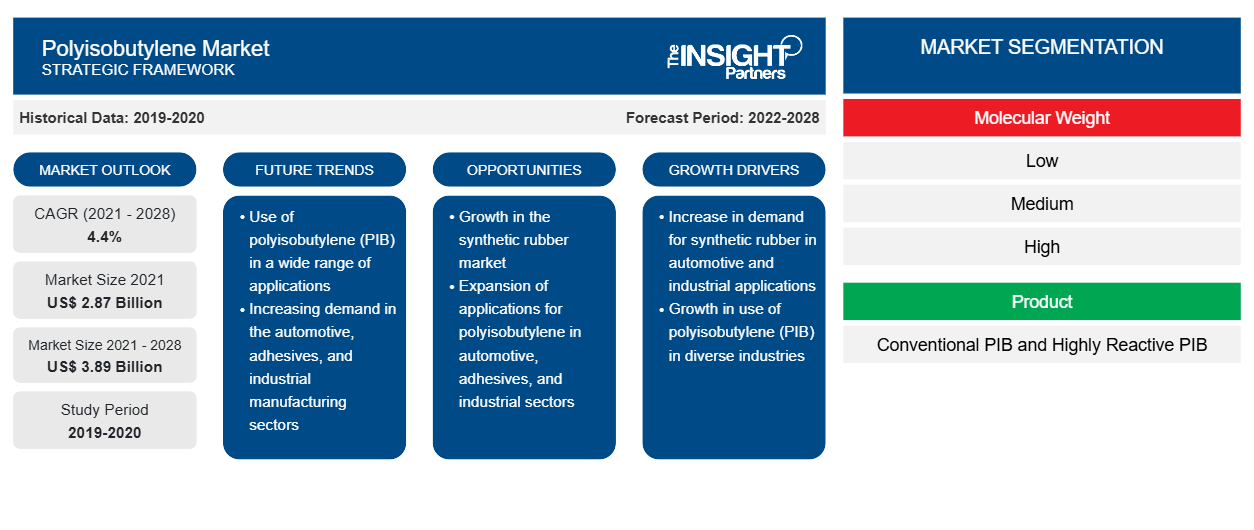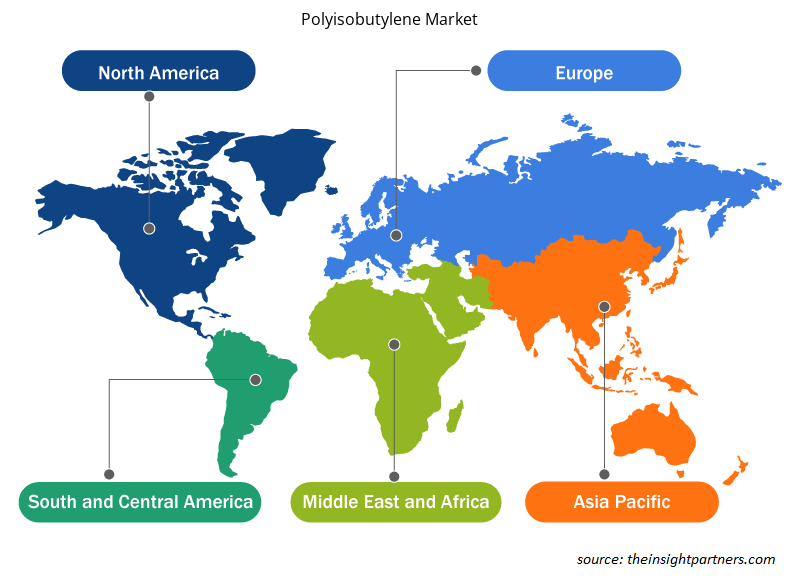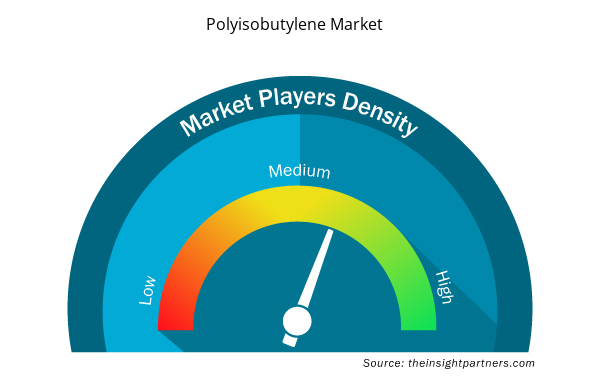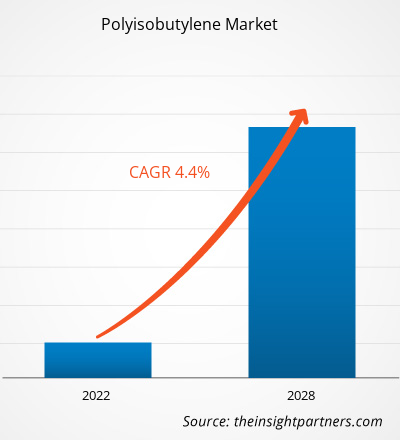[Research Report] The polyisobutylene market was valued at US$ 2,871.14 million in 2021 and is projected to reach US$ 3,891.16 million by 2028; it is expected to grow at a CAGR of 4.4% from 2021 to 2028.
Polyisobutylene (PIB) is an elastomer or a synthetic rubber. By molecular weight, the market is segmented into low, medium, and high. It is a versatile, non-toxic, and water-white viscous liquid. Polyisobutylene can increase tackiness, provide water-repellency, improve viscosity-index, and provide excellent electrical insulation.
In 2020, North America held the largest revenue share of the global polyisobutylene market. Rising demands from various applications, such as transportation, agrochemical, electrical, and adhesive, drive the growth of the market in North America. Polyisobutylene is increasingly utilized in the transportation, food, and construction industries as it offers low gas permeability, excellent tensile strength, high chemical resistance, and increased stiffness.
Customize This Report To Suit Your Requirement
You will get customization on any report - free of charge - including parts of this report, or country-level analysis, Excel Data pack, as well as avail great offers and discounts for start-ups & universities
Polyisobutylene Market: Strategic Insights

- Get Top Key Market Trends of this report.This FREE sample will include data analysis, ranging from market trends to estimates and forecasts.
Customize This Report To Suit Your Requirement
You will get customization on any report - free of charge - including parts of this report, or country-level analysis, Excel Data pack, as well as avail great offers and discounts for start-ups & universities
Polyisobutylene Market: Strategic Insights

- Get Top Key Market Trends of this report.This FREE sample will include data analysis, ranging from market trends to estimates and forecasts.
Impact of COVID-19 Pandemic on Polyisobutylene Market
The COVID-19 pandemic drastically altered the status of the chemicals & materials sector and negatively impacted the growth of the polyisobutylene market.The global chemical & materials industry is one of the major industries suffering serious disruptions of the pandemic, such as supply chain breaks, technology events cancellations, and office shutdowns. The global travel bans imposed by countries in Europe, Asia, and North America are affecting the business collaborations and partnerships opportunities. All these factors are anticipated to affect the electronics and chemical & materials industry in a negative manner, which hinders the growth of various markets related to these industries. However, as the economies are planning to revive their operations, the demand for polyisobutylene is expected to rise globally. The demand for polyisobutylene from the downstream industrial lubes and lube additives sectors has started rising with the resumption of business activities and the lifting of lockdown measures globally. Market Insights
Automotive Industry to Fuel Market Growth During Forecast Period
For the automotive industry, performance of engines to perform their daily functions is important. The automotive industry has been the key market for several types of fuel additives for many years. The share for automobiles has continuously been higher than that of the other fuel additives market segment due to the lack of efficient fossil fuel alternatives and an increasing middle-class economy. The relative importance of aviation for fuel additives has boosted in recent years, ultimately mounting the demand for polyisobutylene.
Application Insights
Based on application, the global polyisobutylene market is segmented into tires, industrial lubes and lube additives, fuel additives, adhesives and sealants, and others. The industrial lubes and lube additives segment held the largest share of the market in 2020. Polyisobutylene (PIB) reacts with maleic anhydride to form polyisobutenyl- succinic-anhydride (PIBSA), a basic building block for dispersants in lube oils and detergents in fuels. Its other variant polyisobutylene-succinimide (PIBSI) derived from polyisobutylene (PIB) acts as an antioxidant emulsifier in soluble metalworking fluids and a lube additive building block. PIB also burn cleaner, making them ideal for use in two-stroke engines oils and marine applications where lubricants are subjected to harsh blow-by gases from huge diesel engines.
BASF SE, Braskem S.A., Daelim Industrial Petrochemical Division, Ineos AG, Infineum International Limited., Kothari Petrochemicals., Sibur Holding PJSC, Kemat Polybutenes, The Lubrizol Corporation, and TPC Group are among the key players in the global polyisobutylene market. Players operating in the market are highly focused on developing high-quality and innovative product offerings to fulfill the customer's requirements.
Polyisobutylene Market Regional Insights
The regional trends and factors influencing the Polyisobutylene Market throughout the forecast period have been thoroughly explained by the analysts at Insight Partners. This section also discusses Polyisobutylene Market segments and geography across North America, Europe, Asia Pacific, Middle East and Africa, and South and Central America.

- Get the Regional Specific Data for Polyisobutylene Market
Polyisobutylene Market Report Scope
| Report Attribute | Details |
|---|---|
| Market size in 2021 | US$ 2.87 Billion |
| Market Size by 2028 | US$ 3.89 Billion |
| Global CAGR (2021 - 2028) | 4.4% |
| Historical Data | 2019-2020 |
| Forecast period | 2022-2028 |
| Segments Covered |
By Molecular Weight
|
| Regions and Countries Covered | North America
|
| Market leaders and key company profiles |
Polyisobutylene Market Players Density: Understanding Its Impact on Business Dynamics
The Polyisobutylene Market market is growing rapidly, driven by increasing end-user demand due to factors such as evolving consumer preferences, technological advancements, and greater awareness of the product's benefits. As demand rises, businesses are expanding their offerings, innovating to meet consumer needs, and capitalizing on emerging trends, which further fuels market growth.
Market players density refers to the distribution of firms or companies operating within a particular market or industry. It indicates how many competitors (market players) are present in a given market space relative to its size or total market value.
Major Companies operating in the Polyisobutylene Market are:
- BASF SE
- Braskem SA
- Daelim Industrial Petrochemical Division
- Ineos AG
- Infineum International Limited
Disclaimer: The companies listed above are not ranked in any particular order.

- Get the Polyisobutylene Market top key players overview
Report Spotlights
- Progressive industry trends in the polyisobutylene market to help players develop effective long-term strategies
- Business growth strategies adopted by developed and developing markets
- Quantitative analysis of the polyisobutylene market from 2019 to 2028
- Estimation of global demand for polyisobutylene
- Porter's Five Forces analysis to illustrate the efficacy of buyers and suppliers operating in the industry
- Recent developments to understand the competitive market scenario
- Market trends and outlook, as well as factors driving and restraining the growth of the polyisobutylene market
- Assistance in the decision-making process by highlighting market strategies that underpin commercial interest, leading to the market growth
- The size of the polyisobutylene market size at various nodes
- Detailed overview and segmentation of the market, as well as the polyisobutylene industry dynamics
- Size of the polyisobutylene market in various regions with promising growth opportunities
Polyisobutylene Market
By Molecular Weight
- Low
- Medium
- High
- Product
- Conventional PIB
- Highly Reactive PIB
Application
- Tires
- Industrial Lubes and Lube Additives
- Fuel Additives
- Adhesives and Sealants
- Others
End-Use Industry
- Industrial
- Food
- Others
Company Profiles
- BASF SE
- Braskem S.A.
- Daelim Industrial Petrochemical Division
- Ineos AG
- Infineum International Limited.
- Kemat Polybutenes
- Kothari Petrochemicals
- Sibur Holding PJSC
- The Lubrizol Corporation
- TPC Group
- Historical Analysis (2 Years), Base Year, Forecast (7 Years) with CAGR
- PEST and SWOT Analysis
- Market Size Value / Volume - Global, Regional, Country
- Industry and Competitive Landscape
- Excel Dataset



Report Coverage
Revenue forecast, Company Analysis, Industry landscape, Growth factors, and Trends

Segment Covered
Molecular Weight, Product, Application, and End-Use Industry

Regional Scope
North America, Europe, Asia Pacific, Middle East & Africa, South & Central America

Country Scope
Argentina, Brazil, Canada, China, France, Germany, India, Italy, Japan, Mexico, Saudi Arabia, South Africa, South Korea, United Arab Emirates, United Kingdom, United States
Frequently Asked Questions
Polyisobutylene (PIB) are also used as substitutes for bright stock owing to their advantages such as better viscosity indices and more oxidative and hydrolytic stability. PIB also burn cleaner, making them ideal for use in two-stroke engines oils and marine applications where lubricants are subjected to harsh blow-by gases from huge diesel engines. PIBs are often used in industrial gear oils and have long been used as thickeners in automotive gear oils. The ubiquitous use of polyisobutylene in industrial gear oils is expected to have a positive influence on the polyisobutylene industry.
The major players operating in the global polyisobutylene market are BASF SE, Braskem SA, Daelim Industrial Petrochemical Division, Ineos AG, Infineum International Limited, Kemat Polybutenes, Kothari Petrochemicals, Sibur Holding PJSC, The Lubrizol Corporation, and TPC Group; among many others.
In 2018, the polyisobutylene market was predominant in North America at the global level. North America region has a well-established automotive and transport industry. The increase in the production of automotive propels the demand for polyisobutylene. Therefore, increased demand for automobiles and infrastructure developments in the US and Canada are expected to fuel the polyisobutylene market during the forecast period.
Trends and growth analysis reports related to Chemicals and Materials : READ MORE..
The List of Companies - Polyisobutylene Market
- BASF SE
- Braskem SA
- Daelim Industrial Petrochemical Division
- Ineos AG
- Infineum International Limited
- Kemat Polybutenes
- Kothari Petrochemicals
- Sibur Holding PJSC
- The Lubrizol Corporation
- TPC Group

 Get Free Sample For
Get Free Sample For